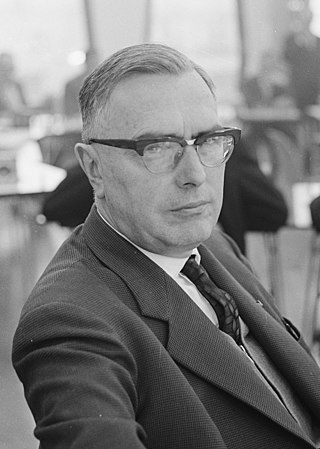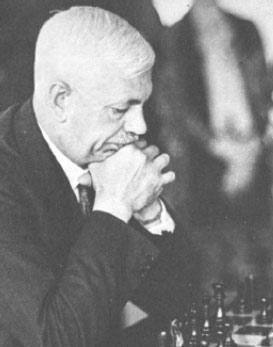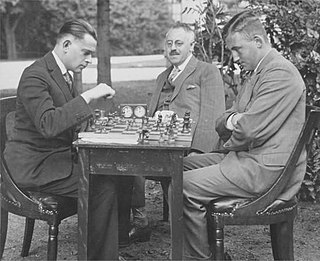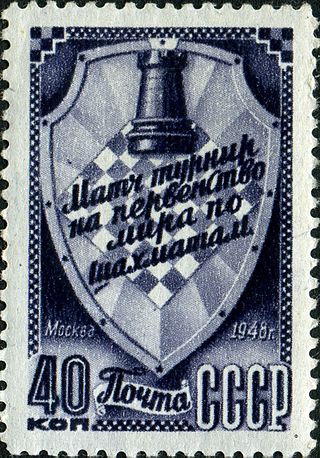Related Research Articles

Alexander Aleksandrovich Alekhine was a Russian and French chess player and the fourth World Chess Champion, a title he held for two reigns.

Machgielis "Max" Euwe was a Dutch chess player, mathematician, author, and chess administrator. He was the fifth player to become World Chess Champion, a title he held from 1935 until 1937. He served as President of FIDE, the World Chess Federation, from 1970 to 1978.

Sir George Alan Thomas, 7th Baronet was a British badminton, tennis and chess player. He was twice British chess champion and a 21-time All-England badminton champion. He also reached the quarterfinals of the singles and the semifinals of the men's tennis doubles at Wimbledon in 1911. Badminton's world men's team championships cup, equivalent to tennis' Davis Cup, is named Thomas Cup after him. Thomas lived most of his life in London and Godalming. He never married, so the hereditary Thomas baronetcy ended on his death.

Reuben C. Fine was an American chess player, psychologist, university professor, and author of many books on both chess and psychology. He was one of the strongest chess players in the world from the mid-1930s until his retirement from chess in 1951. He was granted the title of International Grandmaster by FIDE in 1950, when titles were introduced.

Salomon Mikhailovich Flohr was a Czechoslovak and Soviet chess player and writer. He was among the first recipients of the title International Grandmaster from FIDE in 1950. Flohr dominated many tournaments of the pre-World War II years, and by the late 1930s was considered a contender for the World Championship. However, his patient, positional style was overtaken by the sharper, more tactical methods of the younger Soviet echelon after World War II.

Vera Francevna Mencikova, was a Russian-born Czechoslovak chess player who primarily resided in England. She was the first and longest-reigning Women's World Chess Champion from 1927 to 1944, winning the championship eight times primarily in round-robin tournaments. In an era when women primarily competed against other women, Menchik was the first and only woman competing in master-level tournaments with the world's best players.

Isaac Kashdan was an American chess grandmaster and chess writer. He was twice U.S. Open champion. He played five times for the United States in chess Olympiads, winning a total of nine medals, and his Olympiad record is the all-time best among American players.

Salo (Salomon) Landau was a Dutch chess player, who died in a Nazi concentration camp.

Erik Ruben Lundin was a Swedish chess master.

The 1948 World Chess Championship was a quintuple round-robin tournament played to determine the new World Chess Champion following the death of the previous champion Alexander Alekhine in 1946. The tournament marked the passing of control of the championship title to FIDE, the International Chess Federation which had been formed in 1924. Mikhail Botvinnik won the five-player championship tournament, beginning the era of Soviet domination of international chess that would last over twenty years without interruption.

Henri Grob was a Swiss chess player, artist, and painter. He was Swiss chess champion twice, and was awarded the title of International Master in 1950 at its inauguration. Grob pioneered eccentric chess openings, in particular 1.g4, about which he wrote a book. The opening is today commonly known as Grob's Attack, and it is this opening that brought him fame within chess communities around the globe rather than his results in chess competitions.
Jakob Adolf Seitz was a German–Argentine chess master and journalist.
Pál Réthy was a Hungarian chess master.
Events in chess in 1933:
Below is a list of events in chess in the year 1941.
The below is a list of events in chess in the year 1942.
Zürich 1934 was an international chess tournament held in Zürich from 14 to 29 July 1934 to commemorate the 125th anniversary of Schachgesellschaft Zürich. Alexander Alekhine won, followed by Max Euwe and Salo Flohr tied for second-third. The tournament also served as the 1934 Swiss Championship, won by Hans Johner as the highest-ranking Swiss player.
The 1948 Interzonal tournament was a major qualification event for the 1951 World Chess Championship, held in Saltsjöbaden, Sweden from 16 July to 14 August in 1948. It was the first Interzonal tournament organised by FIDE, which was at the time emerging as the game's international governing body. The 20 player round robin tournament was won by David Bronstein, who along with seven other players advanced to the 1950 Candidates Tournament.
References
- 1 2 3 Kashdan, Isaac, ed. (January 1933), "A Review of the Year", The Chess Review , vol. 1, no. 1, pp. 3–4
- ↑ Kashdan, Isaac, ed. (February 1933), "News of the Month", The Chess Review , vol. 1, no. 2, p. 2
- ↑ These numbers add up to 159, but are given in The Chess Review, Vol. 1. No. 1, p. 4. Perhaps one game was not finished.
- Burgess, Graham (1999), Chess Highlights of the 20th Century, Gambit Publications, ISBN 1-901983-21-8